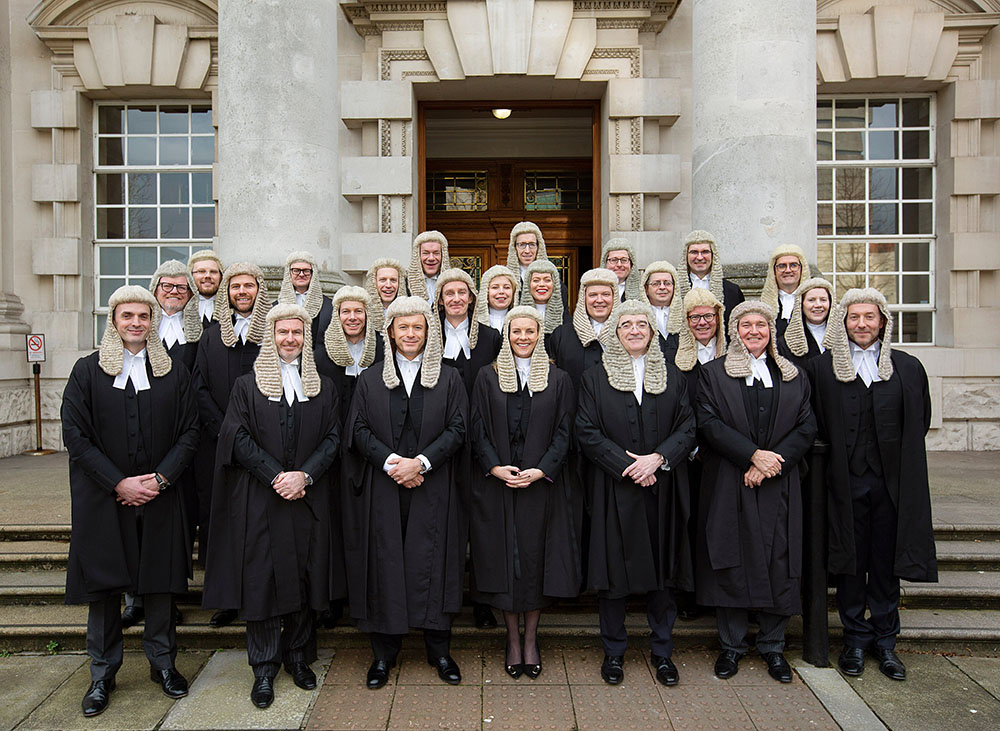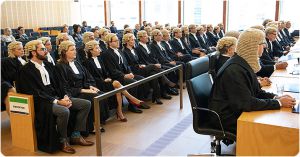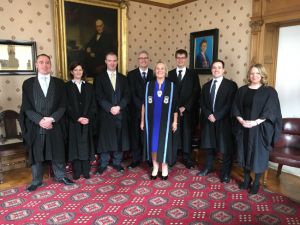Advocacy in the legal system of England and Iran

[vc_row][vc_column][vc_row_inner][vc_column_inner][vc_column_text]
General comparison of the legal system of England and Iran
.
the legal system of England
.
Legal professions in England and Wales are divided into two separate branches in the legal system, solitaire lawyers and barrister lawyers.
Solitaire attorneys tend to work privately with others and are generally the first contact for legal advice. Solitaire lawyers are also employed in government offices and businesses.
A legal association is a professional body that represents solicitor lawyers.
To become a barrister or solicitor you need to study law, but you do not necessarily need to study at university. Undergraduate students who want to study law school later do not need to take all the regular theoretical exams.
Barrister lawyers, on the other hand, generally do not deal with the general public, but take their instructions from the solicitor lawyer as the client’s representative. The Bar Council is a professional body that represents barrister lawyers.
[/vc_column_text][/vc_column_inner][/vc_row_inner][/vc_column][/vc_row][vc_row][vc_column][vc_column_text]
Barrister Lawyers
.
Training and organizing
.
Barrister advocacy requires membership in one of the four London court academies.
The academies support barrister lawyers and law students through educational activities, lunch and dining facilities, access to shared rooms and gardens, and the provision of various grants and scholarships.
One of the main tasks of these academies is to connect barrister lawyers to the Bar Association. Anyone wishing to study law must join one of the academies, and these academies alone have the power to summon students to the bar.
.

the legal system of England
[/vc_column_text][/vc_column][/vc_row][vc_row][vc_column][vc_column_text]
in addition to this responsibility, academies also have a role to play in administering disciplinary courts to deal with more serious complaints than barrister lawyers.
All four academies have a joint legal education council that organizes the education and examinations of affiliated law students.
The Legal Education Council and the Board of Auditors jointly regulate entry into the legal profession.
The role of the council is to determine the conditions for admission, approval of legal courses and providers of practical legal training.
The council determines the eligibility of applicants for admission and provides the certification on which the Supreme Court relies when accepting an applicant to practice law.
To study at an academy, the applicant must provide a comprehensive level, a good academic record and a clean reputation.
During the three years of study, the student needs to pass two main exams:
The first part is theoretical, which university graduates are usually safe from. The second part includes practical courses and is a requirement to become a barrister lawyer (professional law course).
After contacting the bar, a young barrister must complete a one-year student course with an experienced barrister before being allowed to practice independently.
[/vc_column_text][/vc_column][/vc_row][vc_row][vc_column][vc_column_text]
Areas of activity of barristers in the English legal system
.
The main actions of barrister lawyers include going to court, especially higher courts. They speak in court, write summaries, provide legal advice, and provide expert advice for difficult cases. They usually use summaries prepared by solicitor lawyers and accountants. Barrister lawyers analyze the summaries and bring the results to court. There are currently around 10,000 barrister lawyers in England and Wales. Most of them have offices in London. Their elite are the Queen’s advisers, many of whom are elected as judges of higher courts. The queen’s advisers are famous for wearing silk dresses.
Barrister lawyers are generally lawyers who have received special training in litigation and are prosecuted, prosecuted, or defended, depending on who hires them. Ordinary people can not hire a barrister directly, they must be hired or hired by a solicitor. Judges are selected from barrister attorneys known as consultants. A successful barrister lawyer may become the Queen’s advisor on the advice of the Royal High Priest (Speaker of the House of Lords).
The queen’s advisers are known as silks because of the special clothes they wear.
[/vc_column_text][/vc_column][/vc_row][vc_row][vc_column][vc_column_text]
solitaire lawyers
.

the legal system of England
[/vc_column_text][/vc_column][/vc_row][vc_row][vc_column][vc_column_text]
The solicitors have their own professional association, the Legal Society, founded in 1826. A legal association is allowed to regulate the education and admission of solicitor lawyers.
The Law Firm strives to raise the standards of the solicitor advocacy profession to enhance its reputation. Because since the nineteenth century, the reputation of the lawyer is almost equal to that of a barrister.
Public admission to a legal association for a solicitor is similar to admission to a barrister. General qualifications are required to enter the university. A bachelor’s degree from a university is usually required
In order to become a solitaire lawyer , trainees typically complete a three-year law degree (LL.B) and then a one-year legal practice course, and then, assuming examinations, are hired as solitaire trainee attorneys for two years. The form of internship was called the detailed employee until about 1990. Those who have a degree other than law must complete a law conversion course (postgraduate law diploma) one year after their degree and before the law course (so 5 years of full-time study instead of 4 years)
[/vc_column_text][/vc_column][/vc_row][vc_row][vc_column][vc_column_text]
Areas of activity of soloists in the English legal system
.
The field of practice of a solicitor lawyer is versatile and not easily displayed. A solicitor attorney is in direct contact with his clients and gives them personal legal advice. Customers can be members of the community, businesses, volunteers, charities, and more. A solicitor prepares a petition for his clients and personally represents his parties in the courts of first instance (courts, county courts). In higher court cases (Supreme Court or higher) where a barrister attorney is required, the solicitor attorney acts as a representative between the client and the barrister attorney.
In addition, a solicitor attorney oversees contracting and consulting in various legal areas such as taxation, competition, insurance and corporate law.
There are currently approximately 100,000 solicitors in England and Wales. 25% are in employer-employee relations in companies and governments and 75% are self-employed.
Solitaire attorneys have their own offices, either independently or in partnership with other attorneys. Some of them are very specialized and some of them are general. When you, as a client, hire a lawyer to handle your case, they will first advise you and then represent you.
[/vc_column_text][/vc_column][/vc_row][vc_row][vc_column][vc_column_text]
The solicitor’s lawyers will advise you at the first hearing, and they will talk to you on the phone later in the case.
If they have a letter for the other party in the case or their lawyer, they will exchange letters and bills.
They will prepare court articles, statements and requests for you and begin the proceedings.
Your representative is present at some court hearings, and in higher courts your representative will be represented by a barrister
Solitaire attorneys can be your attorney in most family court proceedings, county courts, and the Supreme Court. However, depending on the type of case, the amount of work done by the lawyer, etc., your lawyer may order the barrister to represent you at the hearing.
In general, solicitors or legal advisers are ordinary and trained lawyers who do most of their work outside the court, for example, preparing a will, moving house, and so on.
They can only represent their client in the two lower courts, the Magistrates’ Court and the District Court. A special example of a legal counsel is a police legal counsel who appears in a magistrate’s court to file a lawsuit against a defendant. If the case goes to court in both the civil and criminal systems, a barrister must be hired.
[/vc_column_text][/vc_column][/vc_row][vc_row][vc_column][vc_row_inner][vc_column_inner][vc_column_text]
Advocacy in the Iranian legal system:
.
By nature, in the Iranian legal system, there is only one type of lawyer who has the authority to represent all courts, including the Court of First Instance, the Court of Appeals, the Supreme Court and the Court of Administrative Justice. Also, the jurisdiction of lawyers in filing a lawsuit is not limited to legal or criminal matters or family or other, but if a person receives a power of attorney, he will have the power of attorney in all matters and in all courts.
However, in terms of the form of advocacy in the Iranian legal system, two institutions issue licenses to practice law:
.
A) Bar Association of Justice
B) Judiciary Bar Center
.
In terms of jurisdiction in advocacy, there is no difference between the lawyers of the two institutions, that is, it does not mean that the lawyers of one institution have the authority to sue in higher courts and the lawyers of another institution have the power to sue in lower courts.
[/vc_column_text][/vc_column_inner][/vc_row_inner][/vc_column][/vc_row][vc_row][vc_column][vc_column_text]
Training and organizing a law firm in Iran
.
Employment as a lawyer in the Iranian legal system requires passing the bar exam, ie applicants for the bar can participate in the bar exam of the same institution despite the conditions set by the licensing institutions, and if accepted, they can take the bar. To be busy.
.
In general, applicants for the legal profession must have at least a bachelor’s degree in law or jurisprudence and the basics of law from universities approved by the Ministry of Science or a seminary degree equivalent to the approval of the Ministry of Science.
Also, the minimum age for registration in the bar exam is 24 years and the maximum age for the Tehran jurisdiction is 40 years and for other jurisdictions it is 50 years.
Applicants must complete an 18-month internship with a more experienced lawyer after passing the bar exam.
During the internship, all of the intern’s activities will be supervised by a lawyer.
After the internship and by taking the probationary test, the trainee can work as a first-class lawyer and independently in the legal profession.
[/vc_column_text][/vc_column][/vc_row]




